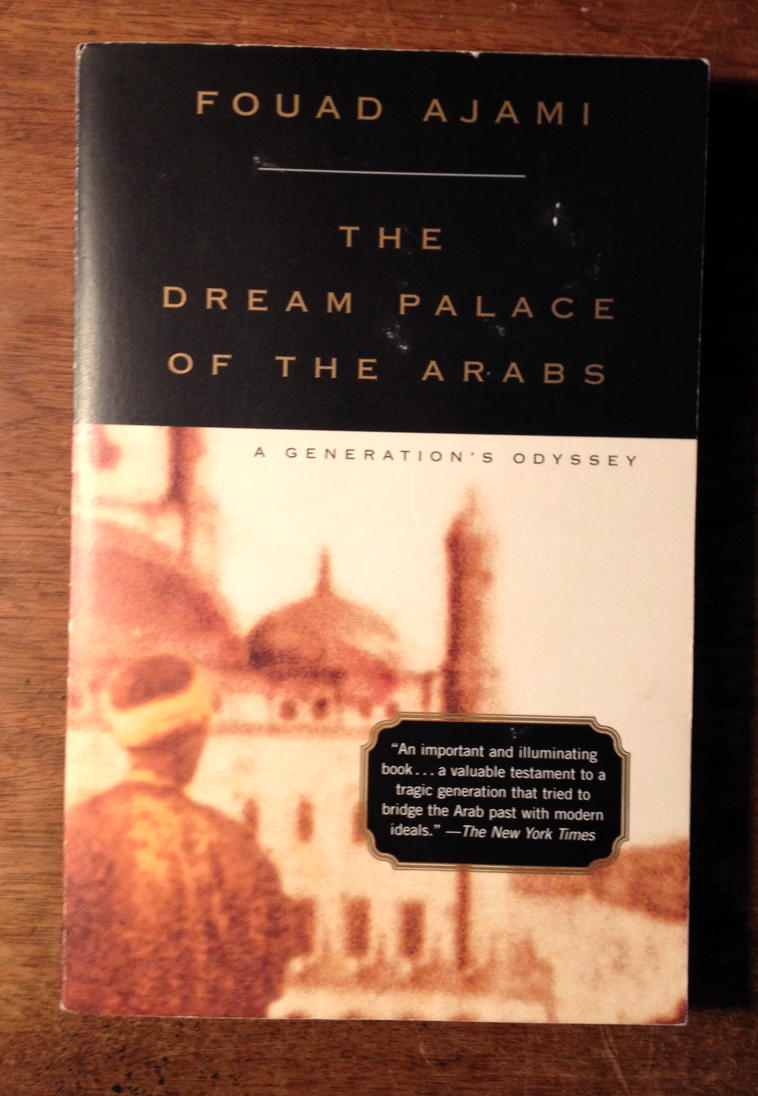Mimsy Review: The Dream Palace of the Arabs
Nothing remains of old Beirut except the scent of it that blows from old notebooks.
Around the net
This is a great introduction to the strange factions of the Arab world, the Shiites, the Sunnis, the Orthodox Christians of Lebanon, Saddam Hussein vs. the princes of Kuwait.
| Recommendation | Worth reading• |
|---|---|
| Author | Fouad Ajami |
| Year | 1998 |
| Length | 353 pages |
| Book Rating | 6 |
Fouad Ajami• tells his story blending it through the poets and writers of the pan-Arab movement. As dictatorships arose elsewhere, exiles flooded into Lebanon and Beirut became a center of literature, poetry, and the dissident arts.
Journalism and the life of letters were in ferment. Beirut was the beneficiary of the coming-to-power of the military officer corps and the ideologues in Syria, Iraq, and Egypt. Every time these lands banished a dissident or a daring writer, the dissident turned up in Beirut.
He quotes “Palestinian-Jordainian diplomat and author Hazem Nusseibah” about the new generation:
“They believed in the blending of what was the best in the newly discovered Arab heritage and in contemporary Western civilization and culture, and they foresaw no serious problem which might impair the process of amalgamation.”
Throughout the book he describes how two generations of poets and other intellectuals went from supporting a pan-Arab world of letters and freedom, to decrying peace and pushing for war.
A whole world had slipped through the fingers of two generations of Arabs who had come into their own in the 1950s and 1960s. A city that had once been their collective cultural home, Beirut, had been lost to them. A political culture of Arab nationalism, which had nurtured them, which had come to them sure of itself and had been accepted whole and unexamined, had led down a blind alley and had been made an instrument and cover for despotism and a plaything of dictators. No ship of sorrow could take these two generations back to the verities of their world. This campaign against the new peace would give the men and women of the pan-Arab tradition a chance to reclaim lost ground.
But their failure led to a dark cynicism. After Khalil Hawi (who is profiled in the first section of the book) committed suicide, “the romantic poet Nizar Qabbani” wrote that
The new jahiliyya [ignorance] is darker than the old. It has annulled the role of the poet because it wants people on their knees. It wants them to crawl. The “sultans of today” want only supporters and sycophants, and this has had the effect of emasculating the language.
Ajami is probably too optimistic at the end, seeing in the very limited abhorrence of the enthusiasm for Ahmad Musa Daqamsa’s 1997 massacre of seventh and eighth grade Israeli schoolgirls (the book was published in 1998) evidence that “in a culture of nationalism where dissent from the prevailing norms had not been easy, many had found their courage and their voice.”
Even in despair, they don’t despair enough. Ajami quotes Abdelrahman Munif:
The “oxygen of liberty,” he said, had been depleted in the Arab world. “That’s why someone observed that Paris is the only place that resembles a capital of the Arabs.” The exiles owed it to those forced into silence to speak the truth “before the final curtain comes down.”
It must be a sad life, the life of the Arab intellectual. The silence now follows them even to France.
Even more interesting than the unique take on recent Arab history—telling it through the lives of poets and writers—is that it gives the reader a good grasp of the various factions in the Arab world.
If you enjoyed The Dream Palace of the Arabs…
For more about Middle East, you might also be interested in Who wants the United States to lead?, The Case for Democracy, and Ohio resists Michigan suicide bombers, rekindles Toledo War.
- The Dream Palace of the Arabs•: Fouad Ajami
- The story of the Arab conflict through the lives of poets and writers.


—the Syrian poet Adonis, late sixties, translation by Fouad Ajami•.